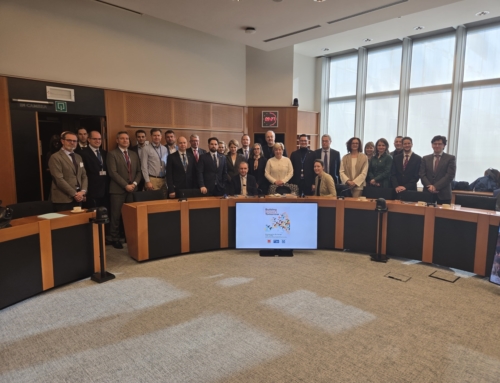Brussels, 16 January 2014
Following a statement on the behalf of the European Commission on “Non-discrimination in the framework of Sexual and Reproductive Health and Rights (SRHR)”, a debate took place at the plenary session of the European Parliament this morning. For observers of the European Parliament it surprising to see this item on the plenary agenda as a resolution on the issue of SRHR was adopted only a month ago and set a clear limit, namely that SRHR is solely the competence of the Member States and not an issue to be dealt with at the EU level.
The statement of the European Commission was crystal clear and reaffirmed the position adopted by the European Parliament, underlining that the EU should not interfere in the area of SRHR but that it’s the Member States’ responsibility to address this issue.
The position of the European Commission, just as the resolution adopted by the European Parliament on 10 December confirm what the San José articles stipulate: “There exists no right to abortion under international law, either by way of treaty obligation or under customary international law. (…) Assertions by international agencies of non-governmental actors that abortion is a human right are false and should be rejected. There is no international legal obligation to provide access to abortion based on any ground, including, but not limited to health, privacy or sexual autonomy, or non-discrimination.”
The motive behind this debate was made very clear by several groups of the European Parliament: it was intended to put pressure on the Spanish Government that is currently preparing a change of the Spanish abortion law that would introduce a restriction of the access to abortion.
At a press conference on 15 January organised by the GUE/NGL group (Nordic Green Left) several MEPs stated their support for the Spanish opposition in a somewhat contradictory discourse. On the one hand Swedish MEP Mikael Gustafsson, President of the Committee on Women’s Rights and Gender Equality, stated that “All member states are free to decide about their abortion legislation”, thus recognizing the subsidiarity character of the issue of SRHR. On the other hand, the GUE/NGL group has launched a declaration “On the Spanish government’s proposal to revoke the current law on sexual and reproductive health and voluntary interruption of pregnancy”, thus interfering with a matter of national competency…
The declaration which has been signed by Members of national Parliaments as well as MEPs offers two clear indications: first that the “Estrela Agenda” is massively supported by the left and liberal political groups and parties; second that the latter don’t hesitate to breach the principle of subsidiarity, which is one of the founding principles of the European Union. Article 5 of the Treaty on the EU stipulates that “Under the principle of subsidiarity, in areas which do not fall within its exclusive competence, the Union shall act only if and in so far as the objectives of the proposed action cannot be sufficiently achieved by the Member States, either at central level or at regional and local level, but can rather, by reason of the scale or effects of the proposed action, be better achieved at Union level.”
That there is a clear divide on the issue of abortion stands clear to anyone who takes the time to observe this issue. That abortion is never a trivial issue is also quite clear. It is precisely for these two reasons that subsidiarity is essential.
The EU was founded upon a quest for peace in Europe and although there might be much to say about the EU, the objective of peace in a political and military understanding has so far been achieved between the Member States. However, there is increasing social unrest throughout the EU related to the financial and economic situation and the consequences it entails, such as massive unemployment. Many EU citizens are very frustrated and suffer from this situation. If the EU is to contribute to the social peace and the social cohesion that underpins it, subsidiarity is essential. Delicate ethical matters that are deeply influenced by national culture, history and social life have to be dealt with at the national level – that’s a prerequisite for social peace on our continent, if not they will divide the EU citizens.
The need for subsidiarity is twofold: not only is there a need for subsidiarity in the relations between the EU and its’ member states, there is also a need for subsidiarity at a smaller scale. In any situation where a child is expected there are three persons involved: the future mother, the future father and their future child. Abortion can be considered for several reasons and it is by no means a simple situation, at the end of the day abortion is a technical solution to a human problem but it can never meet the needs of all three parties involved. The reasons that lie behind the decision that leads to an abortion can vary, but there is always a need for human comfort, for guidance, for support, both for the woman and the man – notwithstanding the right of the child to life. In many cases abortion is the result of an unplanned pregnancy which in its’ turn stems from the prevalent attitude that procreation and sexuality are two separate things.
Concrete actions to reach out to young women and men to encourage them to make responsible choices and take responsible decisions are part of the education of every person. This is first of all the mission of every father and mother who are the first and primary educators of their children. It is also the duty of the society as a whole.
Subsidiarity is defined as a principle that “determines when the EU is competent to legislate, and contributes to decisions being taken as closely as possible to the citizen”. In the case of abortion it is foremost at the level of individual citizens that a difference can be made through education, support and compassion. An EU “one size fits all” solution could never meet the needs of the mother, father and child. It is at a much closer level that things can change, this is why subsidiarity is a twofold need in the EU on the issue of abortion.
Subsidiarity is a prerequisite for peace, as are all the actions to help fight the reasons that push a woman into the decision to have an abortion, or as a famous Nobel peace prize winner, Mother Teresa put it:
“I feel the greatest destroyer of peace today is abortion, because it is a direct war, a direct killing – direct murder by the mother herself. (…) today the greatest means – the greatest destroyer of peace is abortion. (…) Because if a mother can kill her own child – what is left for me to kill you and you kill me – there is nothing between. (…) Let us make this year that we make every single child born, and unborn, wanted.”







